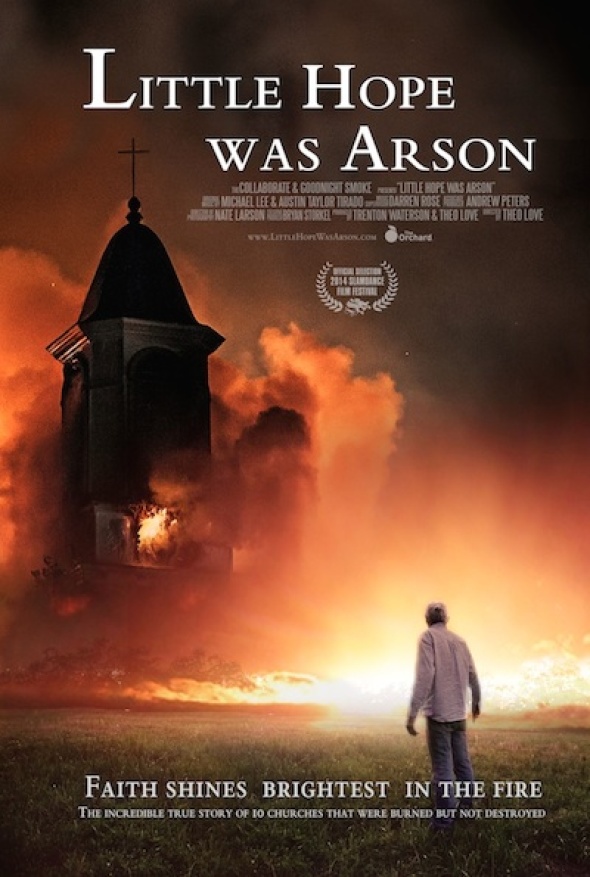In the news|November 24, 2014 08:57 EST
'Little Hope Was Arson' Director Says Violent Church Burnings Serve as a 'Broad Lesson' For God's People [INTERVIEW]

The riveting film that drew standing-room only crowds at film festivals is out now and BREATHEcast caught up with 'Little Hope Was Arson' director Theo Love for a heart-to-heart about the compelling film. He shares what he thinks about the perpetrators of the crime and offers honest advice to churches and their leaders.
The movie is a dramatic documentary about a wave of church burnings that swept through East Texas in 2010. Love takes the audience on a journey of discovering the crimes, the grueling investigation, and the arrest up until where every one is now.
The movie director moved to Los Angeles when he was 18-years-old after his father suggested he become a filmmaker because of his knack for storytelling. Love said he was always on the look out for great stories to tell through film.
"In the news, when I heard about ten churches that burned down in east Texas, not only did it cause reaction as a story teller but it really hit a nerve with my own personal faith," Love admitted, "My parents were missionaries all growing up and I never really had an attachment to a church building."
He disclosed that he of course was surrounded by faith growing up and it was a huge part of his life, but his faith was never associated with a building. The story is about "what happens when you take away a church's building and how that affects their identity of who they are," he said, "That was just a story I was really ready to tell."
Love confessed that coming upon the news of the churches and then making it a film was "pretty much an accident." He was actually looking for a scripted film at the time and never even considered a documentary because he was not familiar with documentaries. When coming upon it he even started writing the events as a screenplay. As he and his teamed researched they felt the people who went through the events deserved a chance to tell their story before they told their version of it.
"When you find a true story there's just something about it," he stated, "We filmed the whole movie without any narration, it's just the people who were affected telling their side of the story."
The powerful footage seen in the film of the church's burning was made available to Love and his team through the local Tyler news station. "They were so excited to work with us and tell this story on a broader level," he said, the station handed them a hard drive of footage with hours and hours of footage to choose from.
Love says it was initially difficult finding a balance between using the news footage and the personal accounts. "We didn't just want this to be another hour-long news story," he said, "We wanted it to be somewhat reflective of 'what does this whole story mean?'"
Even though the film is not pegged a faith based film, it indeed carries a strong Christian theme because of the witness testimonies.
"I'm a Christian and the stories that I tell will probably always come from that worldview," Love said, but he maintains the film is so steeped in Christianity because it took place in the Bible belt. "Regardless of who was telling this there would be a Christian element to it for sure," he added.
"Every single person involved in this project wanted to make sure that we treated our subjects respectfully and what ever they said, what ever they believed, we would try to portray in an honest way," he said, "Not with our agenda but trying to be true to who they were in this moment and it just so happened that in east Texas the majority of the people are church going Christians and so even if we had approached this from a purely secular stand point trying to remove God from it, there's no way to tell this without the story of the gospel."
The film has been well received from both the Christian and secular audience a like. "Both sides of the aisle so to speak have responded positively to the film," he appreciatively noted, "The reaction is very positive to the faith, from people who are almost looking at churches for the first time. We are taking this to the churches now, because ultimately that's who this film is for."
During the climax of the film, Love sits down with the men guilty of the crimes and gets their side of the story. When asked whether or not those accounts were genuine the young director was unsure, but he did say they must have had a good amount of time to think about what they did.
"I interviewed them over three years after the fires, so if you can imagine everyday waking up in a jail cell with nothing but your thoughts, I Imagine you're going to spend time thinking about the events and crimes that got you into that jail cell," he said, "I think that they have come up with a lot of reasons as to why it happened just in the time since it happened."
"They were young kids when they burnt these churches, they were 19 and 21-years-old I don't think you can deny that they had a lot of anger towards the church and towards God especially," he added.
One of the men guilty is named Daniel and he went astray after losing his mother who he was very close to. The young boy went into the hospital chapel and prayed for his mother to live the night she died and when she died he admits that was the last time he prayed.
Love, was seemingly touched by that sentiment and talks about his opinion of that account. "As somebody who is a little bit more aware of the complexities of ideas of God's will and theology in general, that's a heart breaking story," he revealed, "that's a story that communicates failure on the part of the church of not being there to explain a tragic situation to a young man who's obviously confused about his faith."
"I think that the broad lesson for churches of this is that if we're expecting people to come to us or come to our building but we're not going out there and leading people in their time of need, If we're not going to them, then we're not really what the church is suppose to be," he shared.
The film was produced by Trenton Waterson of the Collaborate and Love of Goodnight Smoke, 'Little Hope Was Arson' is executive produced by Bryan Storkel. It debuted November 21 in New York and November 23, in the heart of East Texas where the story unfolded. The film's release will spread to Los Angeles, and a number of other cities including several in Texas, on November 28. See listing below or visit littlehopewasarson.com
CURRENTLY SCHEDULED OPENINGS
Nov. 25, 2014
Oakland Calif. New Parkway Cinema
Nov. 28, 2014
Los Angeles Laemmle Noho 7
San Diego Media Arts Center
San Francisco Roxie Theater
Portland, Ore. Clinton Street Theater
Dallas Texas Theatre
Houston Drafthouse Vintage Park
Austin Drafthouse Slaughter Lane
Lubbock Drafthouse Lubbock
New Braunfels, Texas Drafthouse New Braunfels
Burlington, Iowa Capitol Theater
Dec. 5, 2014
Columbus Gateway Film Center
New Orleans Zeitgeist Arts Center
Edom, Texas Old Firehouse
Juneau, Alaska Gold Town Nickelodeon
Tallahassee, Fla. All Saints Cinema
Watch the chilling trailer below:












